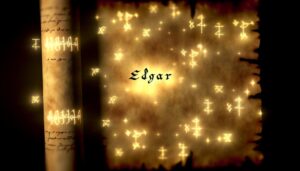Meaning of the Name Maia
The name Maia originates from Greek mythology, where Maia is one of the Pleiades and the mother of Hermes, derived from the Greek word μαῖα. Roman tradition also venerated Maia as a goddess of spring, linking her to growth and fertility.
In various cultures, Maia signifies bravery, strength, and divine power. Astrologically, Maia is tied to the Pleiades star cluster, symbolizing wisdom and nurturing qualities.
The name has evolved over time, remaining popular for its melodic sound and rich mythological roots. Continued exploration will reveal deeper layers of Maia's multifaceted significance.

Key Takeaways
- Maia is derived from Greek mythology, linked to one of the Pleiades and the mother of Hermes.
- In Roman tradition, Maia is a goddess associated with spring, growth, and fertility.
- The name symbolizes nurturing qualities, maternal instincts, and a deep connection to nature.
- Maia signifies bravery and strength in Maori culture and denotes divine power in Hindu tradition.
- The name has a melodic sound and broad cultural appeal, making it popular in modern times.
Etymology of Maia
The name Maia originates from ancient Greek mythology, where it was borne by one of the Pleiades, the daughters of Atlas and Pleione, and also holds significance in Roman tradition as the goddess of spring.
Etymologically, the name is derived from the Greek word 'μαῖα' (Maia), meaning 'mother' or 'nurse,' reflecting connotations of nurturing and growth.
In ancient Rome, Maia was associated with the Latin term 'maius,' which is linked to the month of May, a period symbolic of renewal and fertility.
This dual heritage underscores the name's historical depth and cultural resonance, revealing a rich tapestry of meanings tied to nature and maternal care, signifying both the nurturing aspects of motherhood and the regenerative powers of spring.
Maia in Greek Mythology
Maia, one of the Pleiades and daughter of the Titan Atlas, holds a significant position in Greek mythology.
As the mother of Hermes, she is intricately linked to the Olympian pantheon.
Her heritage and role within the constellation of the Pleiades underscore her importance in mythological narratives.
Maia's Titan Heritage
Among the pantheon of Greek mythology, one finds Maia, a figure belonging to the race of Titans, who were primordial beings predating the Olympian gods. Maia is often depicted as a nymph and is one of the seven Pleiades, daughters of the Titan Atlas and the Oceanid Pleione. Her Titan heritage places her among the ancient divine entities who played pivotal roles in the mythological structure of the cosmos.
| Aspect | Details |
|---|---|
| Parentage | Daughter of Atlas and Pleione |
| Siblings | Six sisters, known collectively as the Pleiades |
| Significance | Primordial influence in Greek mythology |
Maia's lineage underscores her importance within ancient mythological traditions, highlighting her role in the intricate web of relationships among the gods, Titans, and other entities.
Mother of Hermes
In her role as the mother of Hermes, Maia occupies a significant position within Greek mythology, providing critical insight into the complex familial dynamics of the gods. As a nymph and the eldest of the Pleiades, Maia's liaison with Zeus resulted in the birth of Hermes, the messenger god. This union underscores several important themes:
- Divine Lineage: Maia's status as a nymph connects the mortal world with the divine.
- Maternal Influence: Her nurturing role highlights the maternal archetype in mythological narratives.
- Secrecy and Isolation: Maia raised Hermes in a secluded cave, emphasizing themes of protection and secrecy.
- Hermes' Attributes: Maia's characteristics are often mirrored in Hermes, particularly his cunning and resourcefulness.
These elements collectively enhance our understanding of Maia's mythological significance.
Role in Pleiades
As one of the seven Pleiades, Maia holds a pivotal role in Greek mythology, representing the eldest and most significant of the nymph daughters of Atlas and Pleione. Maia's prominence is underscored by her relationship with Zeus, resulting in the birth of Hermes, the messenger god. The Pleiades, often associated with the star cluster of the same name, symbolize various aspects of mythological and celestial significance.
| Pleiad | Role/Significance |
|---|---|
| Maia | Eldest, mother of Hermes |
| Electra | Mother of Dardanus |
| Taygete | Associated with Mount Taygetos |
| Alcyone | Linked to the myth of Ceyx and Alcyone |
Maia's influence extends beyond her own myth, contributing to the larger narratives of Greek cosmogony and divine genealogy, embodying both maternal and celestial attributes.
Roman Interpretations
In Roman mythology, Maia was revered as a goddess of spring, symbolizing growth and renewal.
Her name was so influential that it was immortalized in the month of May, a period associated with fertility and new beginnings.
The Romans integrated her attributes from earlier Greek traditions, highlighting her continued significance in cultural and religious practices.
Goddess of Spring
Among numerous Roman deities, Maia is revered as the Goddess of Spring, representing growth, renewal, and the nurturing essence of the season. Her significance in Roman mythology is underscored by her association with the earth's rejuvenation and the life cycle's continuity.
Maia's domain extends beyond mere seasonal change, symbolizing a deeper, intrinsic connection to the vitality of nature. Key attributes and roles include:
- Fertility Promoter: Maia is celebrated for her role in promoting fertility and agricultural productivity.
- Symbol of Growth: She embodies the burgeoning life that characterizes spring.
- Maternal Figure: Maia is often depicted as a nurturing and protective maternal figure.
- Ritual Significance: Various rites and ceremonies were conducted in her honor to ensure bountiful harvests.
Her veneration highlights the Romans' reverence for natural cycles.
Month of May
The month of May, deriving its name from the Roman goddess Maia, holds significant historical and cultural importance, reflecting the ancient Romans' profound connection to seasonal changes and agricultural cycles. Maia, revered as the goddess of growth and fertility, symbolized the burgeoning life and renewal inherent in May.
This period marked a pivotal phase for Roman agrarian societies, as it was essential for planting and ensuring bountiful harvests. The Romans honored Maia through various rituals, seeking her favor for agricultural success. By naming the month after her, they underscored her important role in their agronomic calendar.
The nomenclature of May thus encapsulates a blend of mythological reverence and practical acknowledgment of the agrarian rhythms essential to Roman life.
Roman Mythology Influence
Roman mythology deeply influenced various aspects of ancient Roman culture, including their interpretations of deities and their associated powers.
Maia, a goddess in Roman mythology, was linked to several significant aspects of life and nature. The Romans revered her for her nurturing and life-giving qualities.
They believed Maia was instrumental in:
- Growth and Fertility: Maia was associated with the earth and its ability to bear fruit.
- Springtime Renewal: Her influence was particularly celebrated during the spring months.
- Wealth and Abundance: Romans invoked Maia for prosperity and wealth, linking her to economic flourishing.
- Connection to Mercury: Maia was considered the mother of Mercury, the messenger god, enhancing her status in the Roman pantheon.
These interpretations underscored Maia's multifaceted role in Roman religious life.
Cultural Significance Globally
Various cultures throughout history have imbued the name Maia with rich symbolic and mythological significance. In Greek mythology, Maia is recognized as one of the Pleiades and the mother of Hermes, the messenger god.
Ancient Romans revered her as a goddess of spring and growth, linking her to the month of May. Meanwhile, in Maori culture, Maia signifies bravery and strength, reflective of heroic figures in their folklore.
Additionally, in Hindu tradition, the term Maya (a variant of Maia) denotes illusion or the divine power that creates the cosmic illusion. Each cultural context enriches the name Maia, adding layers of meaning and further cementing its timeless appeal across diverse societies.
Astrological Connections
Astrologically, the name Maia is often associated with the Pleiades star cluster, which has been significant in various cultural and mystical traditions. The Pleiades, also known as the Seven Sisters, have been revered in numerous ancient civilizations, including Greek, Maori, and Native American cultures. Maia, one of the seven sisters, is frequently linked to themes of fertility, motherhood, and springtime rebirth, reflecting her mythological roots as a nurturing figure.
- Greek Mythology: Maia is one of the seven daughters of Atlas and Pleione.
- Astronomical Significance: The Pleiades are located in the constellation Taurus.
- Astrological Influence: Often associated with the Taurus zodiac sign, symbolizing stability and nurturing.
- Esoteric Traditions: Revered for their supposed influence on human consciousness and destiny.
Literary References
The name Maia has found its place in numerous literary works, often symbolizing themes of rebirth, nurturing, and transformation. In classical mythology, Maia is one of the Pleiades and the mother of Hermes, often depicted as a nurturing figure. This archetype is echoed in various literary pieces, where Maia embodies maternal care and renewal.
For instance, in Ovid's 'Fasti,' Maia is celebrated as a nurturing force tied to the spring season. In more contemporary literature, authors often use the name Maia to evoke a sense of growth and change. Analyzing these references reveals an enduring cultural resonance that links Maia with cycles of life and rejuvenation, making it a potent symbol in the literary canon.
Popularity Over Time
Tracking the popularity of the name Maia over time reveals a fascinating evolution influenced by cultural, historical, and social factors. Historically rooted in Greek mythology, Maia's usage has fluctuated notably.
Analyzing its trajectory, several key trends emerge:
- Ancient Origins: The name Maia has ancient origins, linked to the Greek goddess and mother of Hermes.
- Medieval Period: During the medieval era, it was less prevalent, overshadowed by more traditional Christian names.
- Renaissance Revival: The Renaissance period saw a resurgence, partly due to an increased interest in classical antiquity.
- Modern Revival: In the 20th and 21st centuries, Maia regained popularity, often chosen for its melodic sound and mythological significance.
These phases underscore the dynamic nature of naming conventions across centuries.
Modern-Day Usage
In contemporary times, the name Maia enjoys widespread popularity across diverse cultures, often appreciated for its mythological roots and pleasing phonetic qualities. This name, derived from Greek mythology, where Maia was a nurturing mother figure, resonates with many for its historical richness and elegance.
In modern usage, Maia transcends geographic and linguistic boundaries, appearing frequently in birth registries worldwide. Its adaptability is evident in its presence in various forms, such as Maya or Maja, across different languages. The name's phonetic simplicity contributes to its appeal, making it easy to pronounce and remember.
Additionally, Maia is often chosen for its subtle yet profound connection to nature and ancient traditions, reflecting a timeless choice in contemporary naming practices.
Symbolism and Traits
Renowned for its mythological origins, the name Maia symbolizes nurturing qualities, wisdom, and a deep connection to nature. Rooted in Roman and Greek mythology, Maia was revered as a goddess of growth and fertility, embodying maternal instincts and the nurturing of life. These symbolic traits have transcended through time, continuing to influence modern interpretations of the name.
- Nurturing: In Greek mythology, Maia was the mother of Hermes, epitomizing compassion and care.
- Wisdom: As one of the Pleiades, Maia's association with stars and constellations conveys ancient knowledge.
- Nature: Maia's name is linked to the earth and the springtime month of May, emphasizing renewal.
- Strength: Often depicted as a figure of quiet strength, Maia represents resilience and stability.
This historical and analytical perspective highlights the timeless qualities embedded in the name Maia.
Conclusion
The name Maia is rooted in rich etymological origins and mythological narratives. It functions as a tapestry interwoven with diverse cultural threads. It embodies attributes of nurturing and growth, akin to the Roman goddess of spring.
Maia's celestial ties and literary significance further augment its timeless appeal. Through the ages, the name has maintained its allure and adaptability, symbolizing a perennial bloom that continues to thrive and resonate in modern nomenclature.






